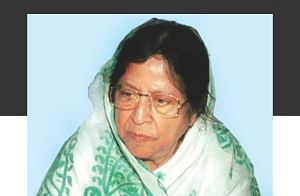An era passes with her

There was stoicism in Syeda Zohra Tajuddin. Even when she suffered greatly, when grief painted her life and that of her family in all the thick dark hues of pain, she made it a point to let her emotions stay within the confines of her private world. No one has ever reported seeing her shed tears in public at the murder of her illustrious husband. Yet everyone senses the tears that must have flowed when the eerie news came in of assassins murdering Tajuddin Ahmad, along with three other illustrious men of Mujibnagar, in the putative security of prison. As the years passed, after 3 November 1975, she brought up a family of three daughters and a son in near silence, in quiet dignity that is the hallmark of men and women of fortitude.
That was the stoic in Zohra Tajuddin. She would see her husband, already ensconced in history as the man who formed the first ever government composed of Bengalis and administered by Bengalis and which government presided over an arduous War of Liberation for Bengali liberty, done to death at the young age of fifty. She would survive him by decades, before passing into the ages days before rounding off eighty years of a life lived in great excitement and profound pain.
For Zohra Tajuddin, beyond grief, it was the need to restore politics to its pedestal that mattered after 1975. It was this calling that called up the feisty in her. When tragedy caused by successive usurpers of authority threatened to rend a historically powerful Awami League asunder, it was her grit and determination that instilled new hope in party activists suddenly bereft of first-tier leadership. Her problem, as she moved to reassure the votaries of Awami League politics that all would be well, was in ensuring that the party did not fall apart in the aftermath of tragedy. There were the factions that cropped up within the party; there was a large section of the party leadership that had either associated itself with the murderous Moshtaque regime or, later, shed principles in favour of opportunism by linking up with the military dictatorship that kept the nation in its grip between November 1975 and May 1981. Those who did not desert the organization wallowed in despair.
In that dark phase of Bangladesh's history, Zohra Tajuddin kept hope kindled in the Awami League, indeed among Bengalis across the spectrum, through her uncompromising belief that the party had to move out of despair into a fresh new spirit of bold enterprise. If the party could survive the repression let loose by Ayub Khan in the 1960s, if it did not flinch from its objectives in 1971, it could very well have a rebirth of glory. She kept the home fires burning, long enough for Sheikh Hasina to come home from exile in 1981 and take charge. And then she moved, or was moved, into the sidelines. To what extent the nation was deprived of committed, forward-looking, liberal leadership through her absence in the centre of things will be debated long and hard.
Any tribute to Syeda Zohra Tajuddin must recall the courage she demonstrated before the Pakistan occupation army once it became known that Tajuddin Ahmad had moved out of Dhaka in March 1971 and into exile. Her shock at discovering that a close family acquaintance would not let her and her children take shelter in his home after the crackdown pushed her into uncertainty. She would not cave in to fate, though. A note reassured her that her husband was safe in Calcutta, to which place she moved with her children. She did not complain when Tajuddin Ahmad made it known that it was the country that came before the family, a promise he kept till victory arrived on a December day. On the day the assassins took Tajuddin Ahmad away to prison in August 1975, she asked him when he expected to be back. Perhaps never, he responded as he went down the stairs. He never returned home alive. It was his bullet-riddled, bayoneted corpse she next saw, before the earth closed in on him.
And now she joins him, in union which promises to approximate the life she shared with him, rather briefly, in the moments of mortality.
With her passing ends an era steeped in idealism and bold leadership. The nation salutes her.

 For all latest news, follow The Daily Star's Google News channel.
For all latest news, follow The Daily Star's Google News channel. 



Comments